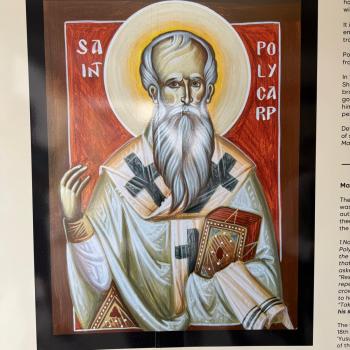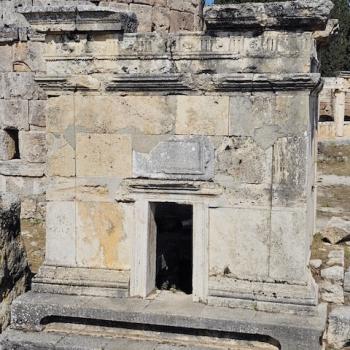‘The Third Nero’ is the fourth novel in the Flavia Albia series, and in various respects it is the best of the four. It is a novel that those who are interested in the setting of the Book of Revelation should read, for here we find a rather paranoid Rome, frightened by various wars, and especially by the prospect of attack by the warriors of Parthia with their famous archers, and equally frightened by their own paranoid megalomaniac Emperor, Domitian, and wishing he could be deposed (any parallels to the current state of politics in America is accidental, as this novel was written before last year’s elections). After the demise of Nero in a ditch in about A.D. 68-69, the rumor had it that Nero had not really died, but had escaped to Parthia, and was going to come back and haunt Rome like a boogeyman. Or the story was that he had actually died, but that somehow he had been conjured back to life and was coming with the Parthians to take his revenge on Rome. In actual fact there had already, by 90 A.D., which is the time frame for this novel, been two such posers who had been dispatched quickly, and now in 90 there was the rumors of a third, who was Nero back from the dead—- again? So instead of ‘finding Nemo’ (which by the way is the Latin word for ‘nobody’) Flavia Albia spends her days trying to find this third Nero.
This all is of relevance if, as is likely the Book of Revelation was written in the 90s during the tyrannical reign of Domitian, who in Nero like fashion, seems to have persecuted Christians…. and demanded, for the first time in Roman history that he be worshipped as ‘Deus et Dominus Noster’ ‘our Lord and our God’. Here for your reflection is the relevant segment of Rev. 13—
And I saw a beast coming out of the sea. It had ten horns and seven heads, with ten crowns on its horns, and on each head a blasphemous name. 2 The beast I saw resembled a leopard, but had feet like those of a bear and a mouth like that of a lion. The dragon gave the beast his power and his throne and great authority. 3 One of the heads of the beast seemed to have had a fatal wound, but the fatal wound had been healed. The whole world was filled with wonder and followed the beast. 4 People worshiped the dragon because he had given authority to the beast, and they also worshiped the beast and asked, “Who is like the beast? Who can wage war against it?”
5 The beast was given a mouth to utter proud words and blasphemies and to exercise its authority for forty-two months. 6 It opened its mouth to blaspheme God, and to slander his name and his dwelling place and those who live in heaven. 7 It was given power to wage war against God’s holy people and to conquer them. And it was given authority over every tribe, people, language and nation. 8 All inhabitants of the earth will worship the beast—all whose names have not been written in the Lamb’s book of life, the Lamb who was slain from the creation of the world.
9 Whoever has ears, let them hear.
10
“If anyone is to go into captivity,
into captivity they will go.
If anyone is to be killed[c] with the sword,
with the sword they will be killed.”
This calls for patient endurance and faithfulness on the part of God’s people.
The Beast out of the Earth
11 Then I saw a second beast, coming out of the earth. It had two horns like a lamb, but it spoke like a dragon. 12 It exercised all the authority of the first beast on its behalf, and made the earth and its inhabitants worship the first beast, whose fatal wound had been healed. 13 And it performed great signs, even causing fire to come down from heaven to the earth in full view of the people. 14 Because of the signs it was given power to perform on behalf of the first beast, it deceived the inhabitants of the earth. It ordered them to set up an image in honor of the beast who was wounded by the sword and yet lived. 15 The second beast was given power to give breath to the image of the first beast, so that the image could speak and cause all who refused to worship the image to be killed. 16 It also forced all people, great and small, rich and poor, free and slave, to receive a mark on their right hands or on their foreheads, 17 so that they could not buy or sell unless they had the mark, which is the name of the beast or the number of its name.
18 This calls for wisdom. Let the person who has insight calculate the number of the beast, for it is the number of a man. That number is 666.
—
Notice three things: 1) the beast that came from across the sea had a fatal head wound, which apparently had been miraculously healed; 2) the worship of the beast was being called for; 3) the symbolic number of the beast is 666- which in gematria= the number of the inscription on a Nero coin which reads ‘divi filii Augusti Neron Caesar’— the divine son, or the son of the divine Augustus, Nero Caesar.
Back to the novel. While the first of these Flavia Albia novels (Ides of April) was not all that appealing and anachronistically depicted Falco’s daughter as a sort of radical feminist out of due season, these novels have gotten better as they have gone along, and this one is full of humor, and one exciting and rambunctious conclusion complete with chase scene through downtown Rome including a rampaging elephant. It’s sort of the ancient version of the Fast and the Furious…. Flavia Albia has become a competent ‘informer’ and ‘investigator’ of plots and plans, and crimes, like her father (who stays conveniently off stage in these novels, so as not to steal Flavia’s thunder). One of the more interesting features of this novel is that it is told retrospectively, from later in the 90s apparently, as the last chapters reveal. Flavia is married to an aedile named Tiberius who on their wedding day was struck by lightning, but survives rather singed and fuzzy and shaky for a while. Yikes! There’s a way to start a marriage with a bang. Of the various writers on ancient Rome (see also Colleen McCullough, Stephen Saylor, Robert Harris) during the NT period, Davis is the most fun to read. She knows her history, but it is her humor that entertains while you are also being informed, that makes her novels stand apart from the rest. Here for your consideration is the official summary of this novel on Amazon—
“In 90 A.D., following the Saturninus revolt in Germany, the Emperor Domitian has become more paranoid about traitors and dissenters around him. This leads to several senators and even provincial governors facing charges and being executed for supposed crimes of conspiracy and insulting the emperor. Wanting to root out all the supports of Saturninus from the Senate, one of Domitian’s men offers to hire Flavia Alba to do some intelligence work.
Flavia Alba, daughter and chip off the old block of Marcus Didius Falco, would rather avoid any and all court intrigue, thank you very much. But she’s in a bit of a bind. Her wedding is fast approaching, her fiancé is still recovering―slowly―from being hit by a lightning bolt, and she’s the sole support of their household. So with more than a few reservations, she agrees to “investigate.”
Adding to the confusion is yet another Nero pretender has shown up in Parthia and is trying to rally support for his claim for the throne. With intrigue upon intrigue swirling around the capital city, it’s up to Albia to uncover what is―and isn’t―the real threat.”
I commend this novel to all who would like to understand life in Rome in the late first century better, while enjoying a good yarn. I also commend it to those who would like to understand the social setting and some of the ideas which underpin the visions of John in Revelation. A good time will be had by all.













